Data Dive
How did your agency roll out telework? An honest assessment from these feds
Federal News Network surveyed more than 1,000 federal employees about their telework situation and received 700 answers to open ended questions that explained h...
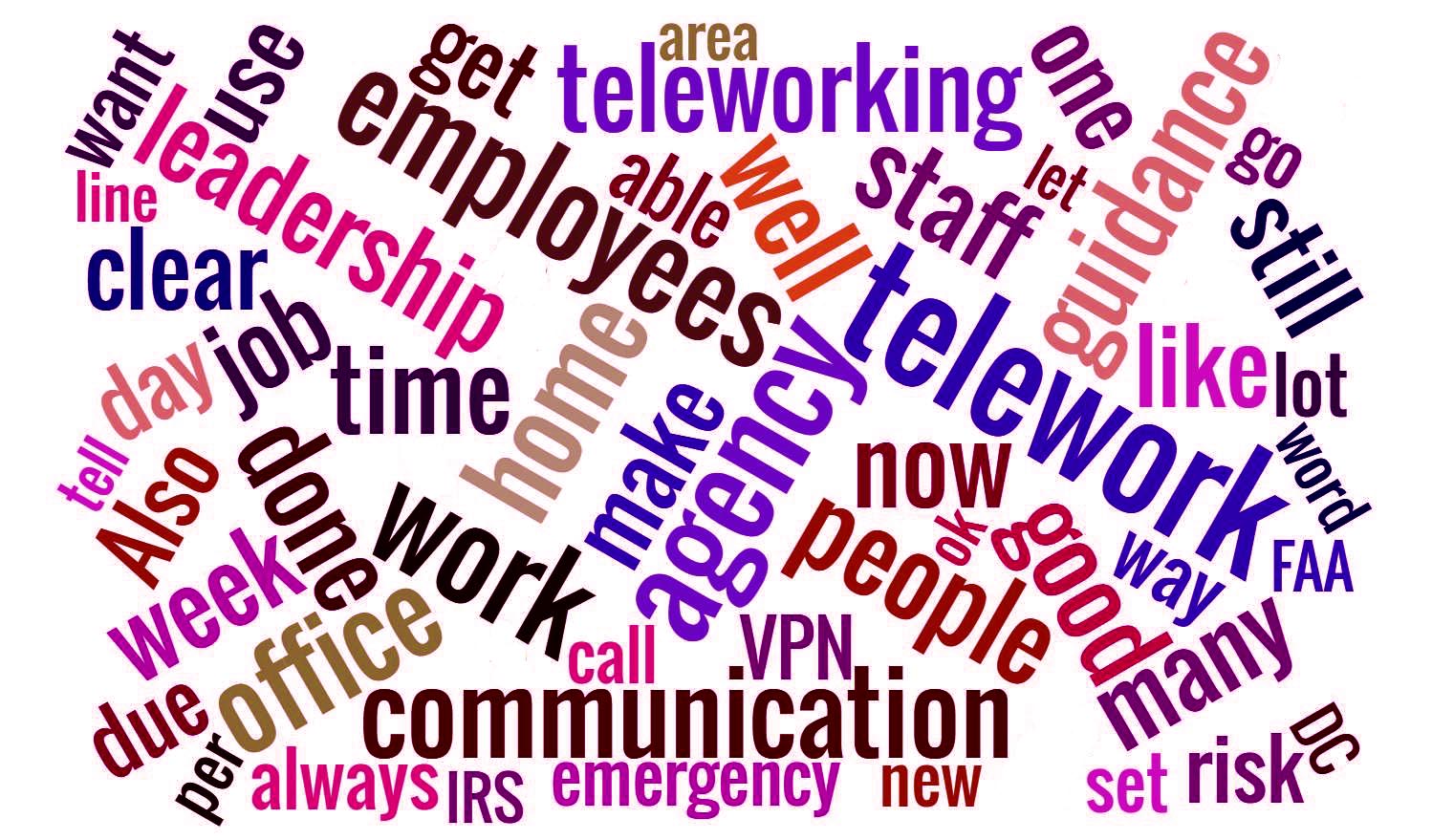
Asking federal employees for comments on telework, particularly during the coronavirus pandemic, is like opening Pandora’s Box. While the government has documented the challenges and opportunities with telework in assorted reports over the last 15 years, asking an open ended question provides insights at a level you don’t normally see in a regular report or survey.
“My agency allowed group leaders to make the call about telework for staff. There was very little top down discussion or guidance which was frustrating for many group leaders,” wrote one fed.
“Embarrassing, confusing, anxiety- creating, boilerplate platitudes,” wrote another.
That is just a few of the 700 responses we received in our exclusive Federal News Network online survey.
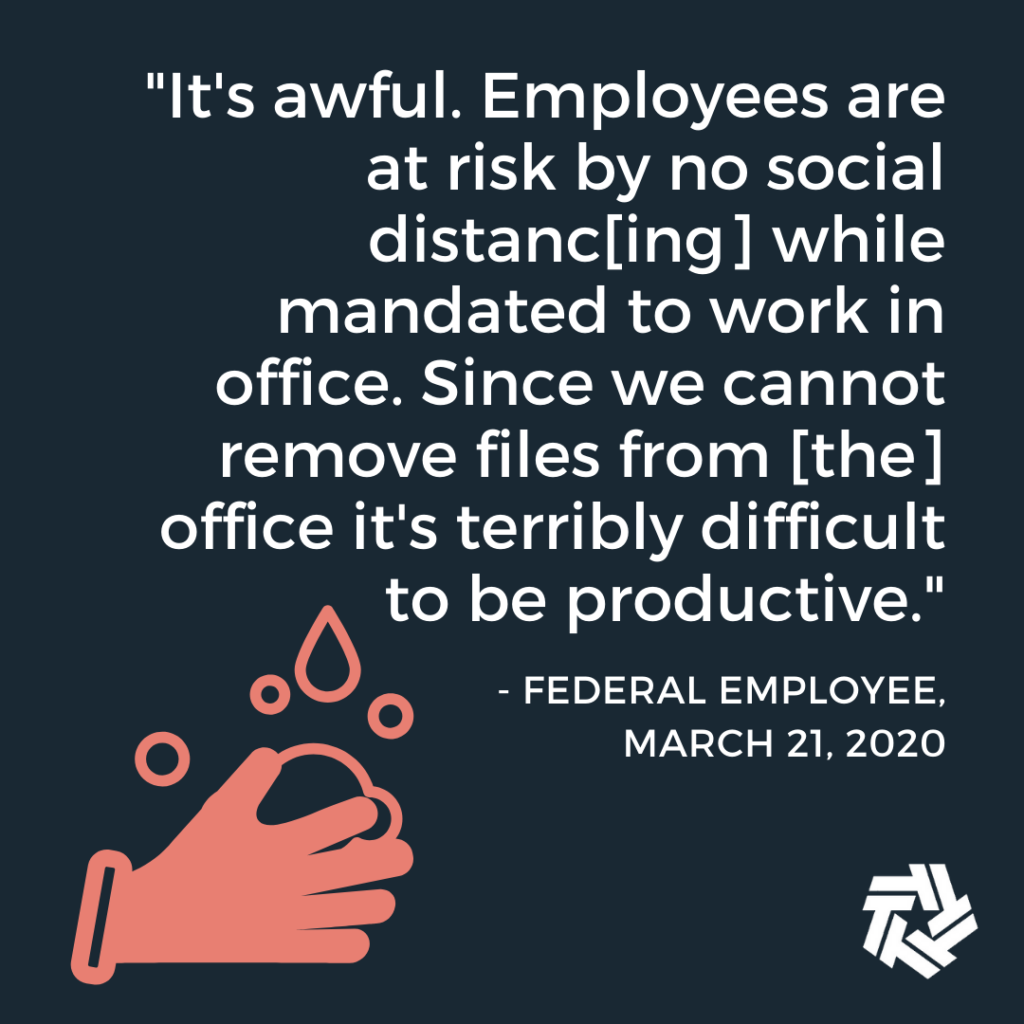
While another employee said, “Excellent. Daily briefings. Leadership taking this seriously. Telework infrastructure upgraded quickly. Transition to telework occurred smoothly. Policies/procedures already in place. Few disruptions. Contractor workforce transitioned to telework. Our department stands ready to continue its service to the American people.”
Federal News Network’s survey of readers from March 18-23 asked a series of questions about their current telework situation. We received 1,114 responses, with 94% identifying as federal employees, of them 69% saying they work for a civilian agency, 13% for the Defense Department and the rest saying they either worked for the intelligence community or belonged to contractor/non-profit/retiree communities.
Proving the value
The responses from the federal employees varied across the board ranging from frustrated and scared to optimistic and excited about the prospects of changing their agency’s view of telework.
“This may be a good litmus test showing managers that employees can telework. I hope the ability to telework will continue after the crisis is over; one to two days a week would be great. Hopefully, the push-back concerning telework from supervisors as well as more established employees will decrease,” one respondent stated.
Another said they are using this opportunity to prove to their manager they can work remotely more often.
“Telework is a plus for the agency, there are positions that are virtual-teleworking from home, others are allowed more than two days per week. I think the majority of managers do not like telework but I stay in constant touch with my supervisor regularly if he could he would probably allow more than two days a week,” the employee said.
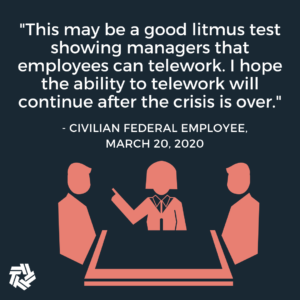
Another said, “For years we managed telework saying work is a task you complete not a place you go. We are strong and efficient because we do every day what others are trying to learn. Shame of the federal government for not supporting telework until now. For all the past government shutdowns, weather events and emergencies, were were on the job and completing the mission for America. Army Strong!”
Productivity skyrockets
For some employees, teleworking is better than being in the office.
“Fewer distractions in the office, especially since so many people are teleworking,” said one federal employee.
Another said, “My agency handled it very well and I think teleworking is a good alternative to working in the office. I am more productive when I telework because I do not have to deal with traffic and waste time commuting.”
The complaint box is filled
But for many respondents, the open ended questions let them vent about their agency’s poor communication, lack of direction from the top and seemingly uncaring response to employee concerns.
“They act like they have no clue, they couldn’t tell us what we needed to do. So since we can only telework for 10 days total so I asked my supervisor if we are required to come back into the office and her response was ‘I don’t know’ I’m not sure why there’s not plan, managers are more worried about people “goofing” off then staying safe,” said one federal employee.
Another respondent said, “Communication was poor. Even when there was no certainty about what would happen, there should have been some communication that decisions were being made. Rumors were running rampant.”
Other federal employees were frustrated with their agency’s communications for other reasons.
“An unnecessarily overwhelming amount of communication to convey a few simple points. Updates come out but many don’t change anything. Easily confusing,” said one employee.
And still another said, their agency acted fast to provide guidance around telework only to have it stalled by headquarters.
“For the [Federal Aviation Administration], communication around COVID-19 has been poor in general. They published guidance for managers to be flexible with increasing telework, but then managers weren’t able to actually make the decision and had to seek higher approval. It wasn’t until OPM updated the status for the national capital region that some guidance finally came,” the employee wrote.
One employee said the lack of communication has opened up more questions than answers.
“My agency ‘highly encouraged’ telework. But that leaves the option for 100% telework or 0% telework and everything in between. What does ‘encourage’ mean? That it would be nice? That you have to do it otherwise your performance evaluation suffers? That there is or is not any enforcement? It is too non-committal a response; I cannot call it a decision. The actual decision was not made above the agency level. It was made within the agency,” the employee said.
Look here for best practices
While other respondents said their agency did a good job telling employees what was going on.
“My agency has given great communications as this unfolded. I have been surprised that it didn’t seem like appropriate safety steps were taken sooner; however, I understand we must follow after the federal directives, which I believe were very, very slow to come. I just wish it was more proactive to encourage those who could to work from home earlier,” said one employee.
Another said, their agency was well prepared. This too was a common theme in the survey.
“There has been regular communication and also drills conducted to ensure current infrastructure can handle increased load from increased number of teleworkers,” said one employee.
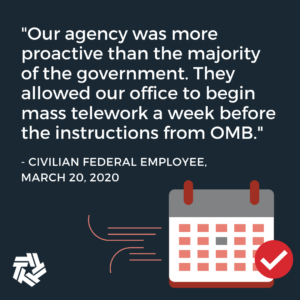
Another said, “My agency has done an excellent job communicating our telework options and ramping up our IT system to handle unusually high volume of teleworkers. This would have been much more difficult if we did not already have telework infrastructure in place. Agencies should invest more resources into telework infrastructure so that they are prepared for emergency situations.”
And a third employee said, “Our agency was more pro-active than the majority of the government. They allowed our office to begin mass telework a week before the instructions from OMB. We are used to teleworking so the transition hasn’t been difficult, although we have discovered some unexpected issues.”
Frustration meter is high
Despite several comments praising individual agency responses, there were many more expressing frustration with how their agency wasn’t prepared for this pandemic.
One employee said because their agency pulled back telework in 2017, it made them less responsive to the coronavirus threat.
“They pulled it back two years ago amid outrage from employees. Now they realize it is not only a good idea, but critical for continuity of operations. Frustrating that it took a pandemic for them to work it out.”
Another said, “If this has not shown that this agency is in no way prepared to handle a major event and continue to serve the public that they are so worried about serving. No softphone licenses, proper equipment etc. If telework would have never been cut, we would have been in a much better place to respond to an event such as this.”
And a third said this emergency proves why the decision to cut telework was wrong, “No reason to have reduced telework from multiple days per week to only one day per week. Telework due to COVID-19 is substantiating that many of us can telework 100% without interfering with productivity and the mission of our office.”
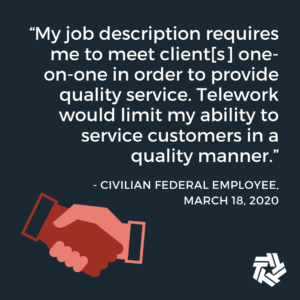
Employees also expressed annoyance at their agency adding more oversight over their work now that they are at home.
“Strangely, my agency has now implemented daily check-ins that were previously not required, in an effort to micro-manage employees. This increases the burden on all employees on top of the psychological stress of dealing with an actual pandemic and inability to move about freely,” wrote one respondent.
Another said, “Despite my track record of teleworking for the last four years, this crisis has spooked higher ups. The entire telework process was scrutinize[d] as different supervisors had their own opinions as to how implement it without risking their own credibility while still trying to maintain normal production goals during a crisis. This is not a good way to operate in such situations.”
Don’t want to, never have
And then there are those that will not telework because they don’t want to.
As one respondent eloquently said, “Do not want to telework, never have!”
And another one said quite directly, “I don’t want to work from home. I am a healthy adult. Let me make my own choices.”
Copyright © 2024 Federal News Network. All rights reserved. This website is not intended for users located within the European Economic Area.
Jason Miller is executive editor of Federal News Network and directs news coverage on the people, policy and programs of the federal government.
Follow @jmillerWFED






